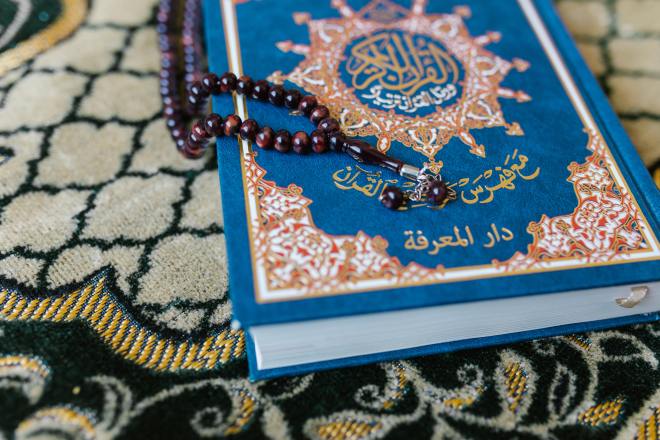Gratitude (As-Syukru) is an attitude that always wants to make the best use of the blessings that Allah SWT has given, both physical and non-physical. Gratitude is also accompanied by an increase in self-approach towards the one who gives favours, namely Allah SWT.
In the Qur’an, there are many explanations about gratitude, including in Surah Al-Baqarah verses 52, 56, 152, 158, 172, and 185; An-Nisa verse 146; Ali Imran verse 123; Ibrahim verses 7 and 144; An-Nahl verses 14 and 114; Al-‘Ankabut verse 18; and Luqman verse 12.

One example of a verse about gratitude in Surah Ibrahim:
وَإِذۡ تَأَذَّنَ رَبُّكُمۡ لَئِن شَكَرۡتُمۡ لَأَزِيدَنَّكُمۡۖ وَلَئِن كَفَرۡتُمۡ إِنَّ عَذَابِي لَشَدِيدٞ (٧).
And ˹remember˺ when your Lord proclaimed, ‘If you are grateful, I will certainly give you more. But if you are ungrateful, surely My punishment is severe.’
Similarly, the hadith states:
قال رسول الله صلّى الله عليه وسلّم : التَحَدُّثُ بِالنِّعَمِ شُكْرٌ وَتَرْكُهَا كُفْرٌ
The Messenger of Allah (SAW) said: “Mentioning (Allah’s) favours is a form of gratitude, and not mentioning them is denial of the favour.”
There are three ways to be grateful:
1. Gratitude with the heart
This means that one is convinced that all kinds of blessings come from Allah. As He says in Surah An-Nahl verse 53:
وَمَا بِكُم مِّن نِّعۡمَةٖ فَمِنَ ٱللَّهِۖ ثُمَّ إِذَا مَسَّكُمُ ٱلضُّرُّ فَإِلَيۡهِ تَجَۡ ٔرُونَ ٥٣.
Whatever blessings you have are from Allah. Then whenever hardship touches you, to Him ˹alone˺ you cry ˹for help˺.
2. Gratitude with the tongue
This means multiplying the words of praise with the words Hamdalah. This is
as mentioned in Surah Ad-Duha verse 11:
وَأَمَّا بِنِعۡمَةِ رَبِّكَ فَحَدِّثۡ ١١
And proclaim the blessings of your Lord.
3. Gratitude with all the limbs
This means using all the limbs to perform actions that are in accordance with the will of the favour giver. For example, being given eyes, then the eyes are used to see the greatness of Allah, not to see something ugly to see the greatness of Allah, not to see something ugly and lead to sin. The same applies to other limbs.
The spiritual benefits of gratitude include:
1. Getting the pleasure of Allah SWT.
2. Avoiding the punishment of Allah SWT. (An-Nisa 147)
3. Getting happiness in the world and the hereafter. (Ar-Ra’du verse 28)
4. Getting additional favours. (Ibrahim verse 7).
5. Get a blessed sustenance. (Al-‘Ankabut verse 17).
6. Make the soul peaceful and away from liver disease and even physical illness.
7. Improve the welfare of life.
Usually, grateful people show signs, including:
1. Rarely complain.
2. Always see the best side of a problem.
3. Does not feel inferior to his/her condition.
4. Likes to be grateful.
5. Not arrogant or overbearing.
6. Likes to share with others.
7. Have a clean heart.
8. Always feel happy.

From the explanation above, we can draw the conclusion that gratitude is a form of our gratitude to Allah SWT for all the favours given by increasing good deeds both with the heart, tongue, and limbs. Thus, we will always feel happy.
A happy heart will give birth to positive things. With positive things, we will avoid all kinds of diseases, both diseases of the heart that will undermine our faith and physical diseases that will undermine our bodies, because according to health research, those diseases are very influential on the mood of the mind and heart. And certainly we will get the pleasure of Allah SWT and the peace and happiness of life in the world and the hereafter.
Hopefully, we are all among His servants who are always grateful to Allah SWT by continuing to increase our faith and piety in Him. Indeed, the essence of gratitude is for ourselves, because Allah SWT does not need His creatures, as mentioned in the verses of the Qur’an.
والله أعلم بالصَواب
Eka Budhi Setiani
Ustazah Eka Budhi Setiani, Lc, is an Indonesian shariah advisor at Muslim Pro. A servant of Allah who has studied at Ushuluddin Al Azhar University – Cairo, Egypt Currently, she is devoting her knowledge to teaching at an Islamic school under the provincial government. Together with her husband, she also managed her own boarding school in a small town in the province of Banten called Ponpes Balonk Faidhul Barokaat.
Related Articles
15 Action-Packed Shows To Binge-Watch This Eid
Celebrate Eid with an adrenaline-packed lineup of captivating shows on Qalbox, offering action, drama, and thought-provoking narratives for viewers of all ages. From epic historical sagas to gripping political dramas, immerse yourself in Muslim-friendly entertainment that showcases diverse voices and experiences. Experience the excitement of shared viewing experiences with family and friends, and support Muslim creators shaping the future of entertainment.
Can Islamic Principles Unlock the Key to Global Sustainability?
Islam, as a holistic way of life, provides profound guidance on how humans should interact with the world around them. Rooted in the Quran and the Hadith, Islamic teachings offer timeless wisdom that shapes the way Muslims treat others and the environment. As we...
Quran Learning Journey: Revealing the Secrets within Surah Al-Baqarah
Explore the profound wisdom within Surah Al-Baqarah, the Quran’s longest chapter. Understand its historical context, key themes of faith, guidance for life, and principles of law and justice. This article reveals the timeless secrets that offer guidance and spiritual enrichment to believers.




0 Comments